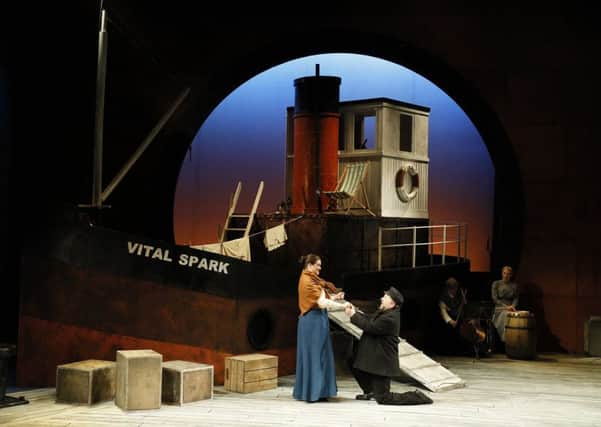Theatre reviews: The Para Handy Tales, The Man Who Followed His Legs & Snout


Pitlochry Festival Theatre **
Festival Theatre, Edinburgh ***
Oran Mor, Glasgow ***
At the time, it seemed like a jolly, uplifting show with a definite 7:84 energy about it; a ceilidh with a light-touch narrative structure, that swept the audience along on a tide of bonhomie and beautifully precise comic language.
In the intervening half-decade, though, this particular voyage of the Vital Spark seems, in its own words, to have got “stuck in the mud at Colintraive”; for Liz Carruthers’s production at Pitlochry is as static and stodgy a piece of theatre as I’ve seen around Scotland in many a day. To one side of the stage sits a very fine, large representation of the Vital Spark herself, stuck forever at a perpetual quayside; on the other side, apparently resident on the dock, sits a rather stuffy-looking Edwardian concert-party featuring a piano, cello and accordion, under the baton of musical director Jon Beales.
Advertisement
Hide AdAnd this arrangement never shifts throughout the entire tale, while Keith Fleming as a slightly embarrassed-looking Para Handy tries to navigate his crew through an episodic narrative-with-songs that falters badly, in the absence of the bustling energy and gentle forward movement that gives Munro’s stories their timeless appeal.
Harry Ward and Stephen Clyde are in fine form as the mate Dougie and the dour, romance-reading engineer, MacPhail; Clare Waugh and Kirsty McDuff offer gallant support as the women in their lives. Yet for all their efforts, the result is a show so couthy, undistinguished and undemanding that it feels as though an entire 45 years of positive change and achievement are being wiped from the record-books, in Scottish theatre as elsewhere.
One of the interesting aspects of Munro’s tales is that they take place just before the outbreak of the First World War; and that same sense of looming crisis just beyond the routine of ordinary life features in the early scenes of The Man Who Followed His Legs (And Kept On Walking), a co-production created by Edinburgh company Wee Stories and Fife Cultural Trust to mark the centenary of the battle of Somme.
The Man Who Followed His Legs is a gently-paced two-hour drama, written and directed by Iain Johnstone, about two young Heart of Midlothian fans who, in 1915, follow the club’s first team players into the Royal Scots, and into the hell of the Somme; and its flashback structure allows it to focus on the story of Johnny, the survivor, who walks away from the trenches after his friend Peter’s death, and finds a new life on a farm in France. It’s an attractive story for adults and older children, and in some ways a brave one, in its focus on the terrible psychological damage inflicted by war; and it features a fine central performance from Patrick Wallace, with impressive support from Scott Hoatson as Peter, and Belle Jones as the young widow who helps Johnny return to some kind of life.
Slaughter is also a key image in this week’s Play, Pie and Pint drama, Snout, a three-handed play by Kelly Jones, co-produced with Sherman Cymru of Cardiff, that dispenses with gentleness, and hits us in the face with a ferociously powerful piece of agitprop against the meat industry. Three women are thrown together in some kind of cell; Viv seems naive and a shade credulous, Coco is whippet-thin and streetwise, Lacey is a glamour-puss in smart black lace.
What soon becomes clear, though, is that these are not women, but pigs; and the play’s all-too-obvious narrative arc involves their gradual realisation that they are being hauled to the slaughterhouse for immediate extinction. The play’s central device is both simple and completely horrifying, as Viv takes to the consolations of religion, and Lacey finds unexpected reserves of strength; and the force of Jones’s writing is backed by three fine performances from Sally Reid, Michelle Gallagher and a terrific Claire Cage as Coco, in a show that - quite seriously - makes a war crime of that tempting rasher of bacon, and asks us to think again
Joyce McMillan